#EU Trademark Registration
Explore tagged Tumblr posts
Text
Why Cyprus Shines as a Shipping Hub in 2025
The global shipping industry is evolving rapidly. Businesses are looking for strategic locations to grow. Cyprus has emerged as a preferred place for international shipping enterprises. In 2025, it’s a top choice for shipping businesses around the globe. Let’s explore why being a Cyprus Shipping Company could be a game changer for growth.
Strategic Location and Maritime Infrastructure
Cyprus’s strategic geographical location—right where Europe, Asia, and Africa connect, is the primary reason of its growing popularity. This makes it a natural link for trade. Shipping companies here can tap into major routes fast, cutting down on time and costs. Cyprus has continuously invested in its maritime infrastructure, with modern port facilities in Limassol and Larnaca. They’ve got the latest tools, ship repair options, and smooth logistics. It’s everything a shipping business could ask for, all in one place.
Attractive Tax Regime for Shipping Companies
One big reason businesses pick Cyprus is the tax setup. The Tonnage Tax System, approved by the European Union, provides substantial tax benefits. Instead of taxing profits, it’s based on the net tonnage of their fleet. This saves money for shipowners, charterers, and ship managers. It’s a practical deal that lets businesses keep more of what they earn while ensuring compliance to global rules.
EU Membership and Regulatory Compliance
Cyprus is a member of the European Union. It follows strict international maritime laws and safety standards. This makes it a reliable jurisdiction for shipping businesses. The Cyprus Shipping Deputy Ministry also plays a crucial role in regulating and supporting the shipping industry. They ensure businesses meet regulations while encouraging fresh ideas and eco-friendly moves. High-Quality Ship Registration Services Cyprus is home to one of the largest ship registries in Europe. It ranks among the top 10 worldwide. Signing up a ship here offers Competitive registration costs. The process is clear, and transparent. A reputable, EU-approved flag ensures global recognition. Plus, there’s no fuss about ship or crew nationality, either. It’s a safe, standard option that shipowners trust.
A Community That Thrives
Cyprus isn’t just a place to work—it’s a shipping hub with heart. The place buzzes with conferences, events, and training sessions. It’s a chance for people in the industry to connect and grow. On top of that, Cyprus has a pool of talented crew. Maritime experts, legal advisors, and financial advisors are all here, ready to help. They keep businesses running smoothly with global regulations compliance.
Bottom Line
Cyprus is a top shipping place. Its strategic location, tax benefits, EU membership, strong ports, and lively community make it go to option for shipping companies. No matter if you’re an established shipping company or looking to start a Cyprus Shipping Company, Cyprus has what you need. It’s a place where businesses can settle in and grow. Professional supports from experts like AGP law can make this process hassle free. They will handle all so you can sit back and focus on your business. Get in touch with them today.
#Cyprus Shipping Company#EU Trademark Registration#Fund registration Cyprus#Ship registration fees and tax#Best Law Firm in Cyprus#Ship Registration Cyprus#Cyprus Company Formation#Lawyers in Cyprus
0 notes
Text
Golden Visa Cyprus: Everything You Need to Know in 2025
Cyprus is a popular spot for people dreaming of European residency. The Golden Visa Cyprus program is a simple way to permanent residency and Best Law Firm in Cyprus like AGP law is making this happen. Golden Visa Cyprus is great for individuals who want an access to the EU market, a good quality of life, and tax benefits. This guide breaks down everything you need to know about Golden Visa Cyprus in 2025.
What is the Cyprus Golden Visa?
The Golden Visa Cyprus is residency-by-investment scheme. This program offers numerous advantages, including the right to reside indefinitely in Cyprus. That means you can live there as long as you want. You also get visa-free travel in the Schengen Zone (once Cyprus joins) and a straightforward path to citizenship.
Why Choose the Cyprus Golden Visa?
This program has a lot to offer. First, you get residency for life—no renewals, no hassle. Second, it’s a fast-track process. Most people get approved in just two or three months. Third, you don’t have to live there full-time. Visiting once every two years is enough. It also covers your family—your spouse, kids under 18, and even dependent adult children up to 25. On top of that, Cyprus has low taxes, which is a big win for businesses and residents. Best part? After five years of residency, you can apply for citizenship.
What You Need to Invest in 2025
To join the program, you need to invest at least €300,000. You’ve got a few choices. You can buy a home worth €300,000 (plus VAT). Or you can put that money into a Cyprus company that has at least five employees. Another option is investing €300,000 in Cyprus-based funds.
One thing to note: government bonds used to count, but not anymore. Besides the investment, you need a yearly income of €50,000. Add €15,000 if you’ve got a spouse, and €10,000 per child. You’ll also need a clean criminal record and proof your money is legit. It’s straightforward, but there’s some paperwork involved.
How the Best Law Firm in Cyprus Helps
Applying for the Golden Visa can feel overwhelming. That’s where the Best Law Firm in Cyprus like AGP Law comes in. They know the process inside and out. They’ll help you pick the right investment—whether it’s a house, a business, or funds. They’ll handle all the legal documents so you don’t miss a step. They also double-check everything to make sure you follow Cyprus laws. With a professional help, Golden Visa Cyprus is a seamless process.
Bottom Line
The Golden Visa Cyprus is one of the best residency programs out there in 2025. It’s quick, flexible, and packed with perks. Whether you’re an investor or moving with family, it’s a smart move. Want to make it easy? Team up with the Best Law Firm in Cyprus. They’ll guide you through every part of the process. Thinking about applying? Get in touch with AGP Law today for expert support!
#Best Law Firm in Cyprus#International Law Firms in Cyprus#Corporate Lawyers in Cyprus#EU Trademark Registration#Lawyers in Cyprus#Litigation lawyer Cyprus#Family lawyer Cyprus#Limassol Lawyers
0 notes
Text
Trademark registration is an essential legal step for businesses seeking to safeguard their brand identity. A trademark gives you exclusive rights over your brand elements, such as a logo, slogan, or name, preventing unauthorized use by others.
0 notes
Text
Why You Should Register a Trademark in the EU
Registering a trademark in the European Union (EU) is a strategic move for businesses looking to protect their brand across a vast and economically powerful market. The process to register trademark EU offers comprehensive protection, covering all 27 member states with a single application. This not only simplifies the registration process but also provides significant cost savings compared to registering trademarks in individual countries.

Benefits of EU Trademark Registration
When you register a trademark in the EU, you gain exclusive rights to your brand across the entire European Union. This means your trademark is legally protected from infringement in all member states, offering a robust shield against unauthorized use. With the rise of e-commerce and the globalization of business, having a trademark registered in the EU ensures that your brand is secure in one of the world’s largest markets.
Another advantage of EU trademark registration is its simplicity. Instead of filing multiple applications in different countries, you submit a single application to the European Union Intellectual Property Office (EUIPO). Once approved, your trademark is protected across the entire EU. This streamlined process not only saves time but also reduces administrative burdens and costs.
The Registration Process
To register a trademark in the EU, you need to submit an application to the EUIPO. The application should include a clear representation of your trademark and a list of the goods or services you want it to cover. After submission, the EUIPO examines the application, and if no objections or oppositions are raised, your trademark is registered.
Conclusion
For any business looking to expand or operate within Europe, it’s essential to register a trademark in the EU. It’s an investment in your brand’s future, providing the protection and peace of mind needed to grow your business confidently across multiple countries.
#register trademark EU#eu trademark#eu trademark registration#trademark search eu#uk trademark registration
0 notes
Text
Website : https://en.intertaxtrade.com
Intertaxtrade, established in the Netherlands, excels in facilitating international business and assisting individuals in Europe with integrated solutions in tax, finance, and legal aspects. Registered with the Chamber of Commerce, they offer services like company management in the Netherlands, Dutch company accounting, tax intermediation, international tax planning, business law consulting, EU trademark and intellectual property registration, international trade advice, and GDPR compliance. Their expertise in financial and accounting services ensures clients have a clear financial overview, aiding in business success.
Facebook : https://www.facebook.com/intertaxtrade
Instagram : https://www.instagram.com/intertaxtrade/
Linkedin : https://www.linkedin.com/in/ramosbrandao/
Keywords: company registration netherlands legal advice online comprehensive financial planning financial planning consultancy international business services international business expansion strategies gdpr compliance solutions international trade consulting european investment opportunities gdpr compliance consulting services in depth financial analysis gdpr compliance assistance cross border tax solutions netherlands business environment european union business law dutch accounting services tax intermediation solutions international tax planning advice eu trademark registration services investment guidance online business law consultancy corporate tax services netherlands financial analysis experts business immigration support startup legal assistance online european market entry consulting international financial reporting services business strategy netherlands tax authority communication support international business law expertise dutch commercial law advice global business strategy services european business consulting online international business services platform expert legal advice online efficient company registration netherlands reliable dutch accounting services strategic tax intermediation proactive international tax planning eu trademark registration support tailored investment guidance specialized business law consultancy dynamic international trade consulting holistic corporate tax services netherlands streamlined business immigration support online startup legal assistance strategic international business expansion european market entry planning innovative cross border tax solutions navigating the netherlands business environment european union business law insights accurate international financial reporting proven business strategy netherlands exclusive european investment opportunities seamless tax authority communication in depth dutch commercial law advice comprehensive global business strategy proactive european business consulting one stop international business services personalized financial planning solutions expert legal advice for businesses quick company registration in netherlands trustworthy dutch accounting services strategic tax intermediation solutions innovative international tax planning efficient eu trademark registration tailored investment guidance online business law consultancy expertise comprehensive corporate tax services netherlands thorough financial analysis support streamlined business immigration assistance navigating netherlands business environment european union business law guidance international financial reporting accuracy business strategy for netherlands market european investment opportunities insights efficient tax authority communication international business law excellence dutch commercial law proficiency global business strategy implementation european business consulting excellence comprehensive international business services proactive financial planning strategies expert legal advice on international matters
#company registration netherlands#legal advice online#comprehensive financial planning#financial planning consultancy#international business services#international business expansion strategies#gdpr compliance solutions#international trade consulting#european investment opportunities#gdpr compliance consulting services#in depth financial analysis#gdpr compliance assistance#cross border tax solutions#netherlands business environment#european union business law#dutch accounting services#tax intermediation solutions#international tax planning advice#eu trademark registration services#investment guidance online#business law consultancy
4 notes
·
View notes
Text
Why You Need a European Union Trade Mark Attorney for Your Business
In the competitive global marketplace, an identity for your brand is paramount to swinging the business. Whether you are a newly established venture, a company with a more extended history, or an international company expanding into Europe, the road towards protecting your intellectual property through trade mark registration begins here. Difficulties of registering Your EU trademark However, navigating the nuances of the European Union Intellectual Property Office (EUIPO) and securing your trademark can be arduous. And this is where a European Union Trade Mark Attorney provides the most value for your business.
Understanding the EU Trade Mark System The EU provides a unified system since businesses can now protect themselves in all 27 member states with only one application before the EUIPO. It is also a very efficient and inexpensive way of obtaining trade marks compared to lodging separate trade mark applications in each country. But there are stringent requirements, legal complexities, and obvious pitfalls that call for expert counsel all along the way. An European Union Trade Mark Attorney ensures that your application is drafted correctly and meets all the legal criteria outlined in the Trade Mark Regulation whilst steering clear of pitfalls that could result in a rejection.
Avoiding Costly Mistakes One of the most significant risks businesses face when applying for a trade mark is making
errors in their application. These can include:
Selection of a mark that lacks distinctiveness – The EUIPO may refuse marks that lack distinctive character.
Not performing a proper trademark search—If you don’t properly search to confirm ownership, you risk infringing on an existing trademark, which could lead to legal action.
Misclassifying goods and services– Trade marks must be filed and registered in a specific class or class, and incorrectly specifying these can greatly hinder or invalidate protection.
A European Union trademark attorney conducts a comprehensive trade mark search, advises on distinctiveness, and ensures that your application is correctly structured to maximize protection and reduce the risk of objections.
Handling Oppositions and Legal Disputes Following the acceptance of your trade mark, third parties will have an opportunity to oppose it during opposition proceedings if their rights conflict with yours.
Opposition to your application
Settle with the other party in the case.
Act for your business in trade mark actions and infringement matters. Without legal counsel, your brand might be attacked, requiring you to rebrand or even lose protection in important markets.
Trade Mark Monitoring and Enforcement You can not just register a trade mark and forget about it; you will need to monitor your registration in case someone else infringes upon your rights. A trademark attorney can provide watch services to monitor potential infringements and take the right actions when needed. They can send cease-and-desist letters, take legal action, and offer guidance on enforcement plans to help you protect your brand image.
Moreover, trademarks are only protected for 10 years before they must be renewed, so again , if not done, protection is lost. A trademark attorney handles renewals and provides counsel to widen the protection to new territories.
Conclusion Obtaining an EU trademark is essential for any business wishing to protect its brand in Europe. But let me tell you that the process entails legal technicalities that only professionals can deal with, such as obtaining the legal know-how, protection, and peace of mind when navigating the trademark system with the protection of a European Union Trade Mark Attorney.
Hiring specialists will ensure that your brand is protected, competitive and legally profitable for the long term. If you are considering trade mark registration concerning the EU, it is a well- thought-out decision to seek advice from a qualified attorney.
#European Union Trade Mark Attorney#European Trade Mark#European Union Trademark Registration#Eu Trademark Attorney#European Patent Attorney
0 notes
Text
The ™ Files
Already a bit ago I was checking for some updates in the trademark files, I just didn't get to write about it. So let's see what's going on at the trademarks.
Some updates
Of course The Sassenach in the class for alcoholic beverages was already filed and registered years back. But there are some updates on it. Not all that exciting though it might depend on the country you live in and how much you're eager to get it.
Since October 2024 the trademark is approved and the brand protected in Australia. So, I don't know if they already found a distributor other than the 'smuggler'. But the smuggler most likely can retire soon, and perhaps some 'sassy' events are in the works in the (near) future for the Aussie fans... 🤷♀️
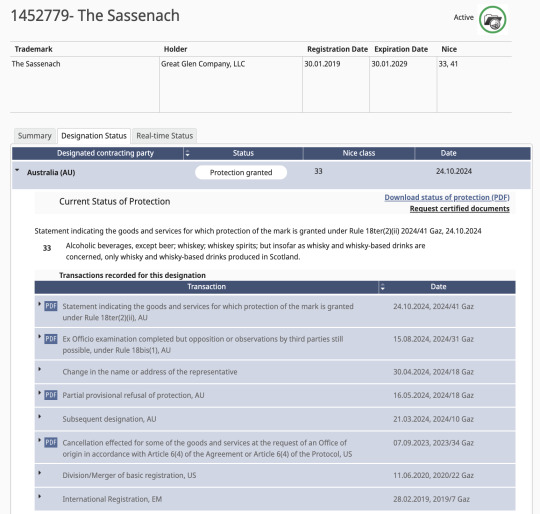
Brazil has been filed as well, but is awaiting decision,
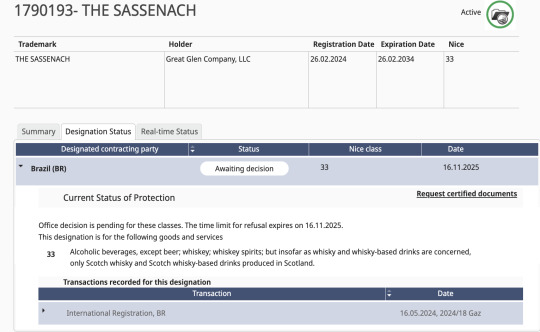
No changes for the European Market (EM). Germany as we know has filed opposition succesfully, which means the brand is not protected in the EM as a whole. For the other EU countries protection of the brand is individually granted though. (which means technically they can sell it in other EU countries but need to protect their brand in every country separately as it can not be protected under the flag of the EUIPO).
Something New
Remember his story after Beyonce launched her ow whisky brand?

Jokingly? Hmm or maybe not so jokingly! Clearly someone got the task consulting the attorney about it. Now you can not trademark a bottle (of course) and we all know how 'his' design wasn't that original to begin with. But the smart attorney came up with a satisfying solution by filing a Logo Mark for the bottle.... 🤭

Filed just a couple of weeks after his sarcastic story and awaiting to be assigned to an examiner.
Beyonce's attorneys wont lose a second sleep over it though, it's only a logo and not the bottle design itself that has been filed for a trademark. Now if they were to print T-shirts or caps with that drawing...
Although the logo has been filed in class 33 (alcoholic beverages, except beer) so not even in the class for clothing!^^

More Brewing
Talking about beer! That was actually the trademark I was more curious about and made me look up what was going on.... and that one made me scratch my head a couple of times (and chuckle as well)
Remember this post where I informed you about the filing of the SS trademark in the class 'Beer', while the trademark they already had in that class (but combined with the class for travelguides) was abandoned.

Also note the Serial Number: 88244818 (read on to learn why)
Now the status for the new trademark filed on 20 Feb 2024 (this date is important) in the class beer... see for yourself:

The trademark has the status 'On hold'. Which means there is an issue that ceases further actions by the office and needs to be resolved first.
So time to investigate the issue at hand! Which can be found in the suspension letter received by the owner (and listed in the documents of the USPTO). It told me that:
USPTO database searched; prior-filed potentially conflicting pending application(s) found. The trademark examining attorney searched the USPTO database of registered and pending marks and found no conflicting registered marks that would bar registration under Trademark Act Section 2(d). 15 U.S.C. §1052(d); TMEP §704.02. However, a mark(s) in a prior-filed pending application(s) may bar registration of applicant's mark.
And the mark that was filed prior that may bar registration is:
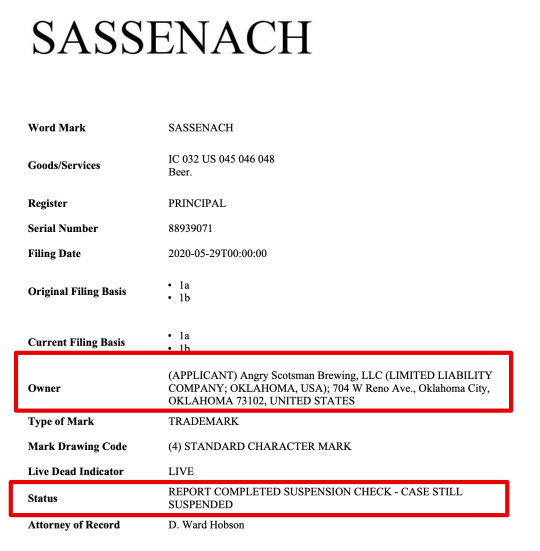
Right a registration filed by the Angry Scotsman Brewing on 29 May 2020 - 3 months after GGC filed their registration for the mark in the class Beer (serial number 88244818) and therefor the status for the Angry Scotsman's mark got rightfully on hold! Even though the Angry Scotsman opposed the decision (there has been correspondence going on between this applicant and the examiner) at the end the Angry Scotsman's application was put on hold and checked periodically.
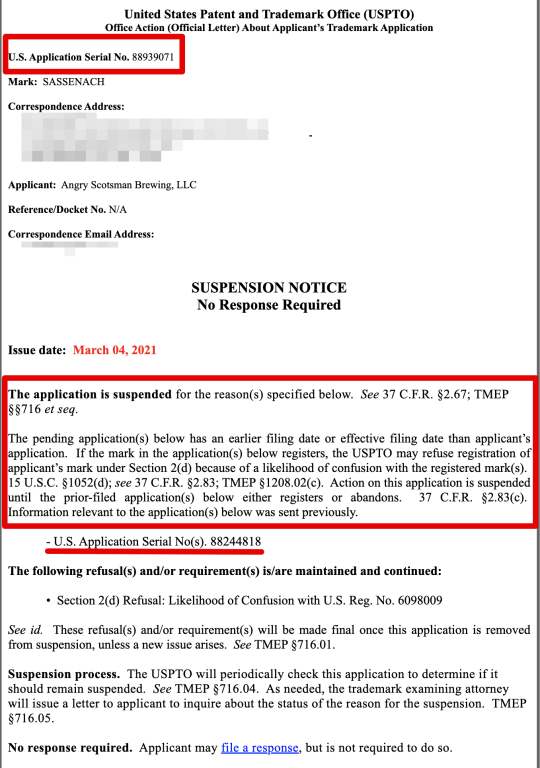
Reason for their suspension was the 'prior filing by the application with serial No. 88244818. But as we now know, that application was abandoned since March 18, 2024. GGC filed a new mark in the class beer.... which is now on hold because.... right, the Angry Scotsman's application was filed prior than the new application of GGC....
Do you see why it made me scratch my head? If GGC had not abandoned their mark, there would have been no issue. But as they already reached the maximum extensions for submitting the Statement of Use, I figure they had no other option here.
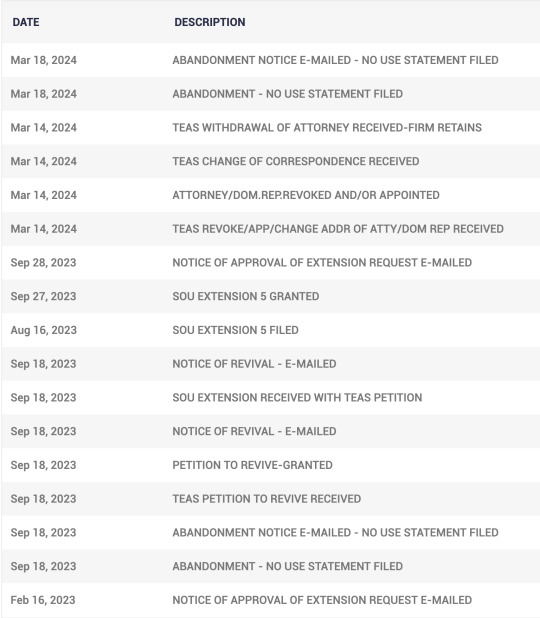

What makes me wonder now is how this will end, as both applications seems to be stuck in an impasse. The last suspension check for the Angry Scotsman's mark is listed on February 1, 2024, a month before the trademark of GGC was abandoned. So theoretically it should be not be in the way for their mark anymore, though I think there might still be an issue of likelihood of confusion even though the original trademark The Sassenach owned by GGC now isn't filed in the class for beer, only the new one that is filed after the Angry Scotsman's mark.
Note that a mark with the status 'On Hold' is not a refusal for the mark. It means the mark is pending as the office will not proceed until the issue at hand is resolved. In fact it is even recommended to use the trademark while it is pending, as this helps trademark owners demonstrate commercial use of the mark and helps solidify their rights to it.
Which is exactly what the Angry Scotsman Brewing did, and demonstrated to the USTPO as evidence.
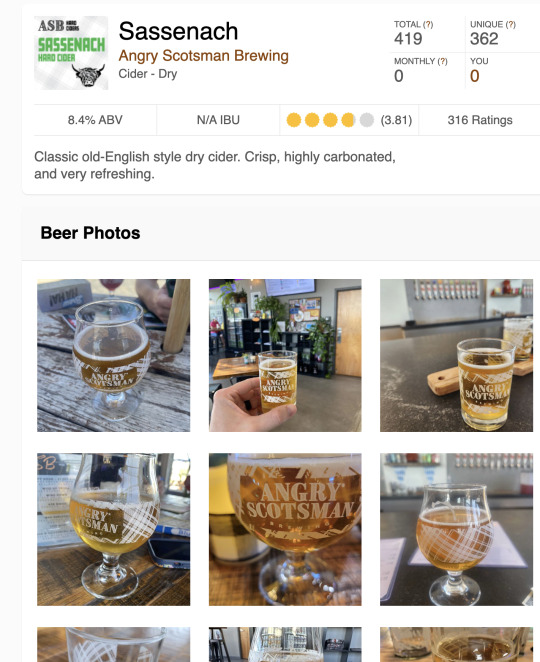
source
Though visiting their website I don't see the Sassenach Beer listed anymore nor does it come up in a search on their website.
To be continued I guess? I will keep an eye on it.
Anyway, to be complete, the mark was filed in Europe and Australia as well in the beer class. In Europe all countries except Germany protection is granted. Germany (and with that the EM) is 'Provisionally Refused'. Which means, there is still time to oppose the decision, but imo it will go the same way as the mark registered in the alcoholic beverages class. Australia granted protection though.
To top it all off, while searching things you always stumble on other things, right! Did you know there is already a Sassenach Beer?

Yes, there is. It's a company from Argentina selling this. Even have an IG (since June 2020) and FB account advertising frequently


Not very expensive though, according to their website 🤭

I'll leave it here, I think you got enough for the weekend! 😂
30 notes
·
View notes
Text
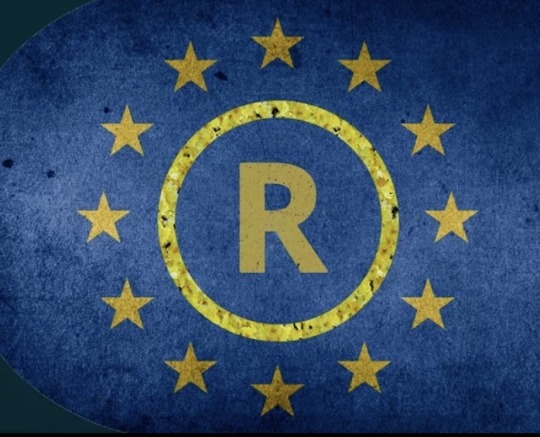
Sam Heughan’s Sassenach whisky brand loses the final legal fight in a trademark dispute in the European Union 🇪🇺
Sam Heughan launched his whisky brand "The Sassenach" in 2020, nickname his character uses for his on-screen love interest in the time travel drama "Outlander". Since 2021, Heughan has been embroiled in a legal battle with "Sasse" a German distillery over the name of his whisky brand, arguing that the Sassenach whisky would confuse customers who might think he is linked to them.
The European Union Intellectual Property Office (EUIPO), which resolves trademark disputes, ruled in favour of the German company and issued a decision upholding the opposition saying The Sassenach could not use the name as a whisky brand. After losing the initial decision at the Fifth Board of Appeals in 2021, Heughan's legal team appealed in 2022 to overturn the decision.
His legal team said there was no risk of confusion as Outlander was popular in Germany. Lawyers for the Sasse distillery, however, said: "The television series may be as popular as the other side claims, which we deny, nonetheless it is not sufficient to assume that the average consumer knows the meaning of that term. Both parties in litigation were given time to present evidence and arguments in their defence and after the Examination period, the Opposition Division’s decision was taken this year 2023.
Great Glen Company or its representative never commented on the EU decisions until last October, in New York when Sam Heughan was asked about Sassenach whisky situation in the European Union in a chat with Mark Gillespie at the Whisky Cast podcast and Heughan's response was very limited, deflecting the question talking about the name in dispute but not the EUIPO's decision, regarding Sassenach whisky that was supposedly aware of the official communication from the European Union Intellectual Property Office - Opposition Division- sent to Great Glen Company in July 2023, which considered that the disputed trademark 'The Sassenach' must be rejected for all the contested goods.
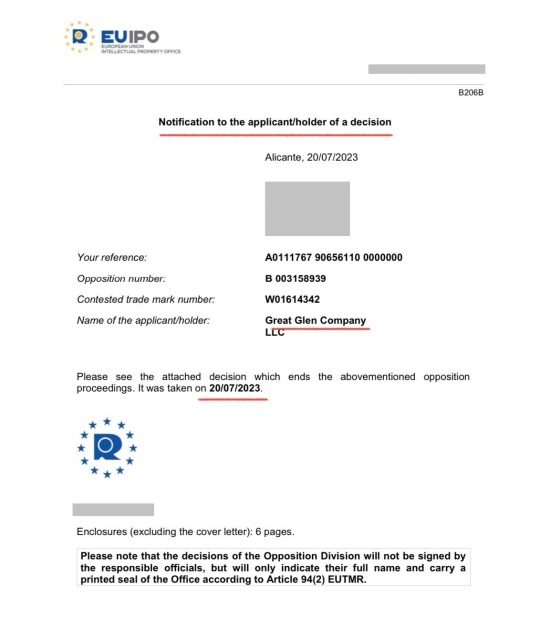
It's a bit curious that after the EUIPO decision, Sam Heughan appeared on a surprise visit to New Orleans, which included podcasts, and events with @sgwinespirits on Tales of the cocktail with an unscheduled tasting of his drinks at the Ritz-Carlton in Nola. Later on, he began his Sassenach sales tour around the United States last summer. If these people had known what had happened with his Sassenach brand in the EU would be different?
In addition, Great Glen Company (GGC) applied to register a new trademark with the World Intellectual Property Organisation (WIPO) and the EU, following the EUIPO decision, following its earlier idea to build on all the Outlander ideas, the new trademark is called "LALLYBROCH SPIRITS" (Lallybroch means "lazy tower" in Gaelic). It will not use Midhope/Lallybroch as a distillery. This new trademark has nothing to do with or relate to the grounds of Midhope Castle, the site of a new whisky distillery with a different brand and ownership. Its new application is already registered in the United States.
It's pending resolution in the EU, Canada and the United Kingdom where Heughan requested its registration.
WIPO
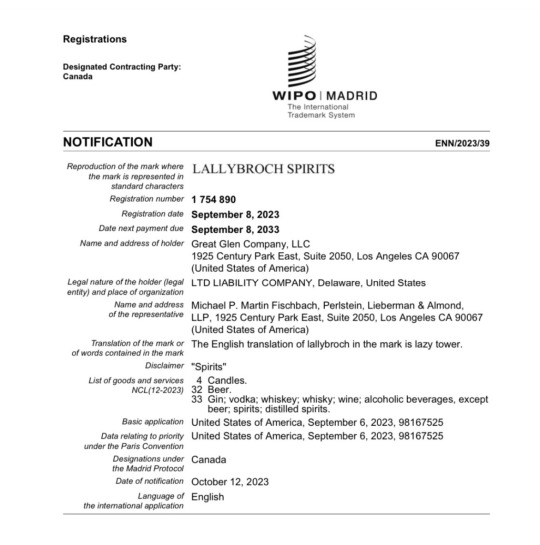
EUIPO
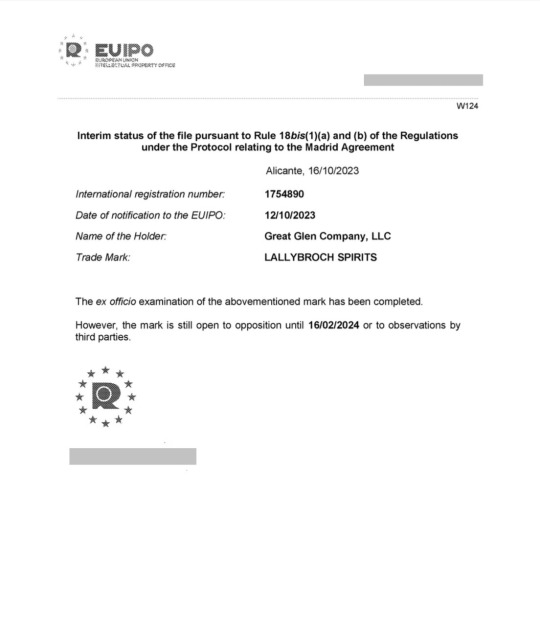
THE SASSENACH UNIQUE SPIRITS
The Great Glen Company, Sam Heughan’s firm, applied to register the brand name Scotch whisky THE SASSENACH UNIQUE SPIRITS as a future trademark to sell the whisky across Europe, but Theo Sasse e.K brand distillery in Schöppingen-Germany, objected claiming the name was too close to its trademarked name, which it uses to sell whiskies and brandies spirits.
On 20th July 2023 the Opposition Division takes the following:
DECISION
1. Opposition is upheld for all the contested goods.
2. International registration is entirely refused protection in respect of the European Union.
REASONS
On 24th November 2021 the opponent Theo Sasse e.K filed an opposition against all the goods (Class 33) of international registration designating the European Union. The opposition is based on, inter alia, German trademark registration ‘Sasse’ (word mark). Also, the opponent invoked Article 8(1)(b) EUTMR and Article 8(4) EUTMR.
LIKELIHOOD OF CONFUSION — ARTICLE 8(1)(b) EUTMR
A likelihood of confusion exists if there is a risk that the public might believe that the goods or services in question, under the assumption that they bear the marks in question, come from the same undertaking or, as the case may be, from economically linked undertakings.
The opposition is based on more than one earlier trade mark. The Opposition Division finds it appropriate to first examine the opposition in relation to the opponent’s German trade mark registration.
a) The goods
The goods on which the opposition is based are, inter alia, the following:
Class 33: Alcoholic beverages, excluding beers. Alcoholic beverages, except beer are identically contained in both lists of goods (including synonyms).
b) Relevant public — degree of attention
The average consumer of the category of products concerned is deemed to be reasonably well informed and reasonably observant and circumspect. It should also be borne in mind that the average consumer’s degree of attention is likely to vary according to the category of goods or services in question. In the present case, the goods found to be identical are directed at the public at large.
c) The signs
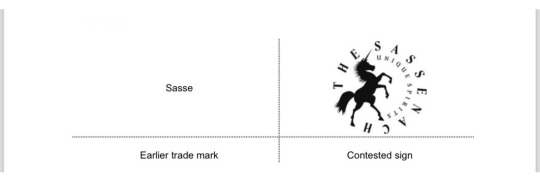
The relevant territory is Germany.
Contested sign The global appreciation of the visual, aural or conceptual similarity of the marks in question must be based on the overall impression given by the marks, bearing in mind, in particular, their distinctive and dominant components. The earlier mark is the word mark ‘Sasse’. The protection of a word mark concerns the word as such and not the specific graphic or stylistic elements accompanying that mark.
The verbal element ‘SASSENACH’ of the contested mark has, contrary to the allegations of the holder, no meaning for the relevant public and is, therefore, distinctive. Likewise, the unicorn device of the contested sign has no particular meaning in relation to the goods and is distinctive.
THE SASSENACH’ in the contested sign are the dominant elements as they are the most eye-catching.
Visually, the signs coincide in ‘SASSE’, which represents the entire earlier mark. The signs differ in the representation of a unicorn and the additional letters ‘-NACH’ (after SASSE) and the non-distinctive elements ‘The’ as well as ‘UNIQUE SPIRITS’ in the contested mark. Thus, the single word element of the earlier mark is fully contained in the most distinctive verbal element of the contested mark. That fact alone is a clear indication of a visual similarity. Therefore, the signs are similar to a below-average degree.
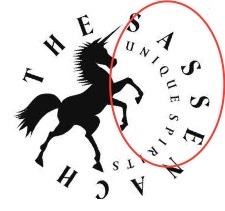
Aurally, the signs coincide in the syllables ‘Sas-se’, which is the sole and distinctive element of the earlier mark and the beginning of the most important verbal element of the contested sign, ‘Sas-se-nach’. The signs differ in the last letters of this word (one syllable), ‘nach’, and in the first verbal element of the contested sign, ‘The’. The fact remains that the earlier mark is entirely included at the beginning of the most important verbal element of the contested sign.
Conceptually, the signs will always be dissimilar as the contested mark will be understood with at least one meaning, namely the unicorn in the contested mark. As the signs have been found similar in at least one aspect of the comparison, the examination of likelihood of confusion will proceed.
d) Distinctiveness of the earlier mark The distinctiveness of the earlier mark is one of the factors to be taken into account in the global assessment of likelihood of confusion. In the present case, the earlier trade mark as a whole has no meaning for any of the goods in question from the perspective of the public in the relevant territory. Therefore, the distinctiveness of the earlier mark must be seen as normal.
e) Global assessment, other arguments and conclusion The goods at issue are identical. They target the general public, who possesses an average degree of attention. The earlier mark has a normal degree of distinctiveness. The signs are visually similar to a below average degree and aurally similar to an average degree since the sole and distinctive element of the earlier mark, ‘Sasse’, is entirely reproduced at the beginning of the contested sign’s only fully distinctive verbal element, ‘Sassenach’. Evaluating the likelihood of confusion implies some interdependence between the relevant factors and, in particular, a similarity between the marks and between the goods or services.
Considering all the above, especially taking into account that the earlier mark is entirely reproduced in the contested sign and used for goods that are identical, the Opposition Division finds that there is a likelihood of confusion on the part of the public. Therefore, the opposition is well founded on the basis of the opponent’s German trade mark registration It follows that the contested trade mark must be rejected for all the contested goods. As the earlier right German trade mark registration leads to the success of the opposition and to the rejection of the contested trade mark The Sassenach for all the goods against which the opposition was directed.
The trademark status was "totally refused", meaning that THE SASSENACH UNIQUE SPIRITS trademark cannot be registered in the EU. If SH's trade mark application is refused, he can file an appeal. He must file his notice of appeal within 2 months from the date of the refusal decision (August-September) and the grounds of appeal must be filed within 4 months from the same date of notification (October-November). But, He did not appeal and last November the EUIPO confirmed by letter the provisional refusal of his trademark and refused its protection in the European Union. The final decision was published on 14 December 2023.
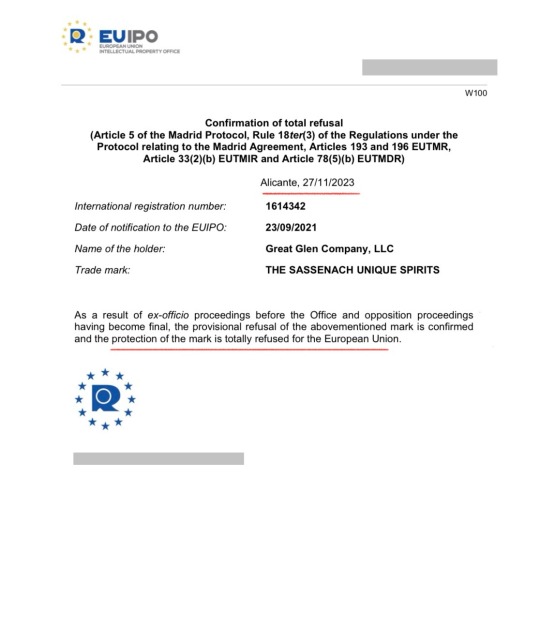
Conclusion
The EUIPO’s decision of the Board of Appeals, regarding its whisky has a “displacement” because Sassenach whisky cannot be registered as a trademark in the EU, the Sassenach trademark was refused. SH must be aware the significance of the total refusal decision regarding its whisky brand. If he was planning to recover from a legal dispute by putting his gin on an impromptu Sassenach tour around US last summer, proving that his recent EU legal battle was a mere bump in the road, he should have thought twice. He lost a legal battle to register his Sassenach whisky brand as a European Community trademark ® in 27 states. It is a big difference. It seems that if Heughan wants to continue selling its whisky, it will have to change the name.
LALLYBROCH SPIRITS registration:
United Kingdom
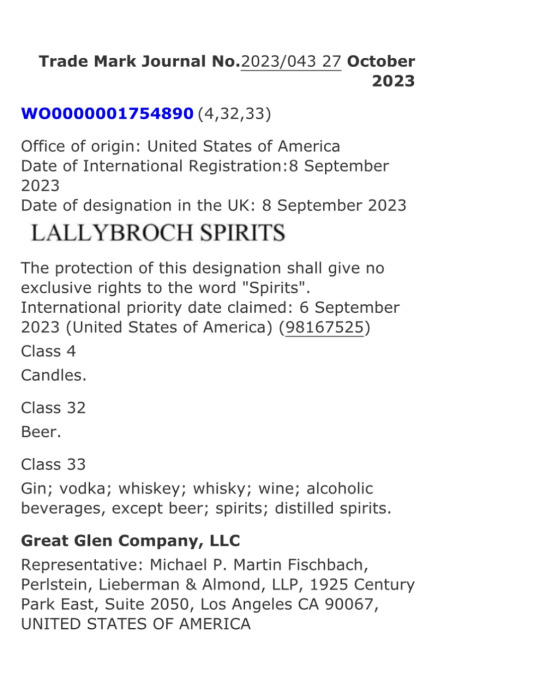
Canada
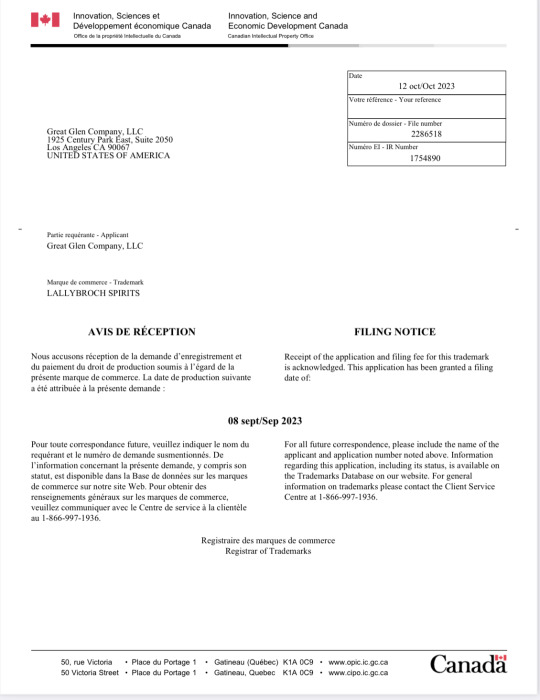
USA
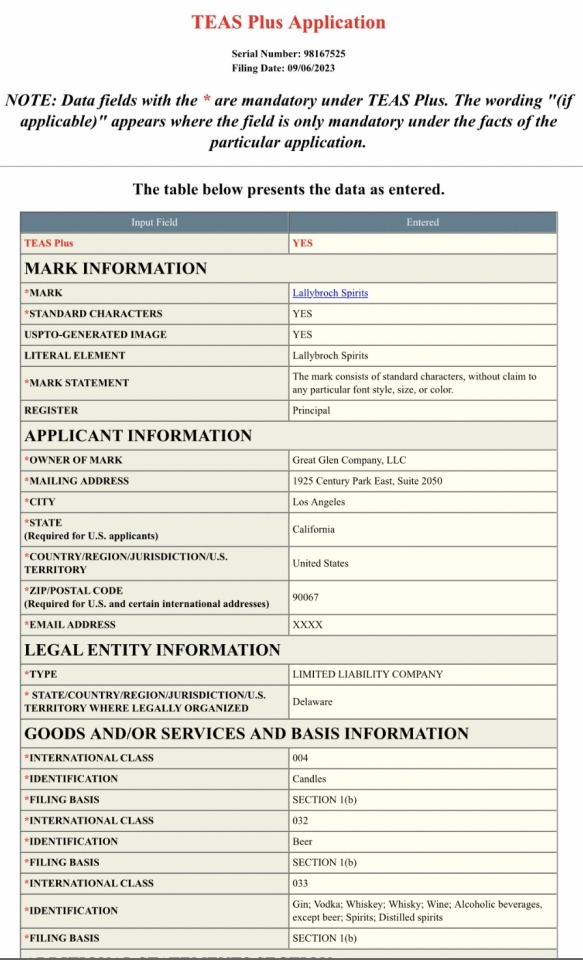
26 notes
·
View notes
Text
Geographical and Industry-Specific Considerations in Trademark Registration
trademark registration plays a crucial role in protecting a business’s identity, ensuring its exclusivity, and securing its intellectual property. However, the process and considerations for trademark registration can vary significantly depending on geographical location and industry. Businesses must navigate specific legal frameworks and tailor their strategies to address the unique challenges and opportunities within their region and sector. This article explores the key geographical and industry-specific factors influencing trademark registration, offering practical insights for businesses looking to protect their brand.
Geographical Considerations in Trademark Registration
1. Variations in Trademark Laws by Country Trademark registration laws differ across countries, and understanding these legal distinctions is critical for businesses operating in multiple regions. For instance, the United States follows a "first-to-use" system, meaning trademark rights are granted based on actual use of the mark in commerce. In contrast, countries like China adopt a "first-to-file" system, where trademark rights are granted to the first entity that files for registration, regardless of prior use.
Businesses should familiarize themselves with the legal framework of their target markets to ensure compliance and prevent potential disputes. Engaging local legal experts or trademark attorneys can help navigate the complexities of jurisdiction-specific laws.
2. International Trademark Protection For businesses seeking global expansion, protecting trademarks across multiple countries is essential. The Madrid Protocol provides a streamlined process for international trademark registration, allowing businesses to file a single application and designate multiple member countries. Despite this convenience, companies must still consider the local trademark laws of each designated country, as enforcement mechanisms and legal interpretations may vary.
Additionally, regional systems like the European Union Intellectual Property Office (EUIPO) allow for a single trademark registration that covers all EU member states. Such systems offer cost-effective solutions for businesses targeting specific regions.
3. Language and Cultural Sensitivity Geographical considerations in trademark registration extend beyond legal frameworks to include linguistic and cultural factors. A brand name or logo that resonates positively in one country may have unintended meanings or negative connotations in another. For example, when Coca-Cola entered the Chinese market, it initially faced challenges with transliteration that resulted in unflattering interpretations of its name.
Businesses must conduct thorough market research and consider linguistic nuances when registering trademarks in foreign markets. Employing local expertise can help identify potential cultural or linguistic pitfalls.
4. Protecting Trademarks in Emerging Markets Emerging markets often present unique challenges for trademark registration. In some regions, trademark squatting—where individuals register trademarks in bad faith with the intention of selling them to legitimate businesses—is a common issue. Countries like China and India have witnessed numerous cases of trademark squatting, making it vital for businesses to act proactively by registering their trademarks early.
Moreover, enforcement mechanisms may be weaker in certain countries, requiring businesses to adopt robust monitoring and enforcement strategies to safeguard their intellectual property.
Industry-Specific Considerations in Trademark Registration
1. Industry-Specific Regulations Certain industries are subject to specific regulations that influence trademark registration. For example, in the pharmaceutical sector, drug names must meet strict guidelines to avoid confusion with existing products. Regulatory bodies like the U.S. Food and Drug Administration (FDA) and the European Medicines Agency (EMA) review proposed drug names to ensure they are not misleading or too similar to other trademarks.
Similarly, in the food and beverage industry, trademarks must comply with labeling laws and certifications, such as geographic indications (GIs) for products like Champagne or Parmigiano-Reggiano. Businesses in regulated industries should work closely with legal and regulatory experts to navigate these additional layers of complexity.
2. Technology and Software Trademarks The technology and software industries face unique challenges in trademark registration due to the rapid pace of innovation and global competition. Protecting trademarks for software products, apps, or digital services requires careful consideration of cross-border applicability, as these products are often distributed globally through online platforms.
Additionally, businesses must monitor for potential trademark infringements in the digital space, including cybersquatting and unauthorized use of trademarks in domain names or online advertising.
3. Fashion and Luxury Goods In the fashion and luxury goods industries, trademarks are critical for establishing brand identity and maintaining exclusivity. Counterfeiting is a significant issue in this sector, with fake products flooding markets worldwide. Registering trademarks not only protects logos and brand names but also extends to unique designs, patterns, and even packaging.
Luxury brands often employ advanced anti-counterfeiting technologies, such as blockchain-based authentication, to complement traditional trademark protections. This dual approach helps safeguard their intellectual property and maintain consumer trust.
4. Entertainment and Media In the entertainment and media industries, trademark registration often involves protecting not just brand names but also characters, slogans, and titles of creative works. For example, movie studios frequently trademark the names of films, franchises, and iconic characters to prevent unauthorized use and generate revenue through licensing and merchandising.
Businesses in these industries must also address jurisdictional differences in copyright and trademark laws, as the lines between these two forms of intellectual property can sometimes blur.
Practical Tips for Businesses
Conduct Comprehensive Trademark Searches: Before filing for trademark registration, conduct thorough searches to ensure that your desired mark does not conflict with existing trademarks in your target market.
Act Early and Proactively: Register trademarks as soon as possible, particularly in markets prone to trademark squatting or counterfeiting.
Engage Local Experts: Partnering with local attorneys or consultants can help navigate cultural, linguistic, and legal nuances.
Monitor and Enforce: Regularly monitor markets for potential infringements and take swift action to enforce your trademark rights.
Adapt to Industry Needs: Tailor your trademark strategy to address industry-specific challenges and regulations.
Conclusion
Geographical and industry-specific considerations in trademark registration highlight the need for a strategic and informed approach to protecting intellectual property. By understanding regional legal frameworks, addressing cultural nuances, and adapting to industry-specific challenges, businesses can effectively safeguard their trademarks and build strong, resilient brands. Whether expanding into international markets or operating in highly regulated industries, a proactive and well-informed trademark strategy is key to long-term success.
0 notes
Text
Trademark Registration In Rohini
A Comprehensive Guide to Trademark Registration with CA Nakul.
Companies and individuals should register their trademarks to protect their logos, ensure exclusive rights to their name, logo, or other identifying marks, and prevent intellectual property theft and unauthorized asset usage. In today's competitive market, where brand recognition greatly influences consumer decisions, only your brand assures that they are identified with your products or services. This course comprehensively explains trademark registration, including its definition, procedures, benefits, and important things to remember at each stage.
What is trademark registration?
The legal process by which a company, individual, or group acquires the exclusive right to use a distinctive name, logo, slogan, or symbol that symbolizes their products or services is called trademark registration and if it is instrumental they are used for measurement Trademark owners are granted certain rights once they are registered with the relevant government agency to prevent others from using the same mark in commerce, such as the United States Patent and Trademark Office (USPTO). ) in the United States.
Benefits of trademark registration
Exclusive legal rights
The legal protection offered by trademark registration is by far its greatest advantage. The exclusive right to use a mark in a registration jurisdiction (such as the US or the EU) is granted to the trademark owner at the time of registration This means that a mark similar to a registered trademark has the form of a it is confusingly unusable by any third party in relation to comparable goods or services
Nationwide security
For example, there is a trademark registered for nationwide protection in the United States. Registration grants you nationwide rights and prohibits any mark from being used anywhere in that jurisdiction, even if your company only operates in one state
public knowledge and frustration
By notifying the public that the mark has been protected, a registered trademark serves as a warning to others that legal problems can be avoided before they begin due to the deterrent effect of its infringement may therefore have legal implications.
The brand value went up
Trademarks increase the overall value of a company, especially for companies looking to sell, license, or enhance its intellectual property. A well-known trademark can grow into a key asset that improves both a brand’s marketability and goodwill.
Legal concepts of legitimacy and ownership
It is assumed that the owner has exclusive rights to the trademark and it is deemed valid after registration. If you need to use this account to pursue your rights in court, it can make the legal process much easier.
Global Security
Additionally, a registered trademark can serve as the basis for an application for trademark protection in another country. Trademark owners can file a single protection application in multiple countries thanks to international treaties such as the Madrid Convention.
the use of the ® symbol
Once registered, you can place the ® symbol next to it to indicate that your trademark is officially registered. This improves your brand’s professional image in addition to alerting you to your legal rights from others.
Trademark registration process
While the exact process may vary depending on the state you are registering in, most jurisdictions have comparable steps. An overview of the procedures for registering a trademark is given below.
Look for trademarks
It is important to conduct a thorough trademark search before submitting an application to ensure that the mark you wish to register exists. This phase involves searching databases of registered and pending trademarks to determine whether it is a trademark you wish to develop or whether there is already a similar one in error
Using the USPTO’s Trademark Electronic Search System (TESS), you can check if your mark is already registered in the United States. It is advisable to seek the advice of a trademark attorney at this stage as trademark law is complex and the investigation of trademark availability can be nuanced
Choose the right trademark
In addition to words, logos and slogans, trademarks can be sounds or smells. It’s important to identify the specific elements of your brand that you want to protect. The specific trademarks are:
Wordmarks: These protect a proper name or word such as "Nike."
Design Mark: These protect graphic marks or logos such as the Nike Swoosh.
Composite graphics: These keep the mix of design and words intact.
Service Mark: FedEx’s logistics services are an example of a service mark that protects services over goods.
Have the application form prepared and submitted.
The next step is to confirm the existence of your trademark, decide which trademark you want to register and submit an application to the appropriate trademark office. It is usually the following delivery.
Name and contact details of the applicant
Explicit trademark representation (in the case of logos, this could be a file or image of the logo).
A description of the goods or services associated with the mark
A statement of intention to use the mark, or a declaration that the mark is being used
Examination of the application
After submission, the Trademark Office reviews the application to ensure that it complies with all standards and does not conflict with existing registered marks. The examiner will look for any potential problems, such as identification, generality, or potential confusion with other markers. If there is a problem, the applicant may have to respond or amend the application.
Protest Books
If the application passes scrutiny, it will be published in the Official Gazette for a specified period of time (usually 30 days in the United States). Third parties can challenge the registration at this stage if they believe it will infringe on their rights. If no objection is raised or the objection is successfully withdrawn, the application will proceed to registration.
Issuance of certificate of registration
If all the conditions are met and no opposition fails, the Trademark Office will issue a certificate of registration. This indicated that the applicant had officially acquired trademark rights.
Preserve the trademark
Trademark protection must be renewed on a regular basis; Not forever. For example, in the U.S. the registration must be renewed every ten years after the fifth and sixth years, and a specific settlement form must be completed If the registration is not renewed, the trademark rights may be lost.
Specific trademark registration restrictions
Even if you have a strong tool to protect your ideas, registering a trademark can present some challenges.
the possibility of confusion
Perceived overly similarity of a mark to an existing trademark is one of the most common grounds for trademark rejection. Your sign may be rejected if there is a possibility of confusing customers.
characteristics
Marks that distinguish rather than distinguish the goods or services they represent are often rejected. For example, "Best Burger" may not qualify for trademark protection if it is considered too generic for a hamburger business.
A general term
Because it refers to a broad range of products or services, generic terms—such as "computer" for a computer—cannot be trademarked. The logo should be distinctive enough to be easily identified as a source.
Trademarks are not used
In many jurisdictions, a trademark must be used commercially in order to be registered. If you cannot provide proof of actual use, your application may be rejected.
Unwanted things
After competitors or other stakeholders may challenge your trademark registration
0 notes
Text

At AGPLAW, we prioritize continuous learning and professional growth to deliver world-class legal services. Our unwavering commitment to education and excellence fuels our ability to navigate complex legal landscapes, including Incorporation of Cyprus Companies, Corporate Services Cyprus, and Dubai Company Formation. 🌍
We specialize in offering expert support for Forex Company License Cyprus, Forex Broker Setup Cyprus, and Fund Registration Cyprus, alongside tailored assistance for EMI Registration Cyprus. Our maritime services extend to Ship Registration Cyprus, Cyprus Shipping Company structuring, and Yacht Registration Cyprus.
Furthermore, our expertise includes EU Trademark Registration, ensuring global protection for your intellectual property. Excellence isn't just what we do; it's who we are. 💼⚖️
Website - https://www.agplaw.com
#cyprus company formation#lawyers in cyprus#emi registration cyprus#forex broker set up cyprus#forex company license cyprus#family lawyer cyprus#litigation lawyer cyprus#Lawyers in Cyprus#Limassol Lawyers
0 notes
Text
Trademarks are essential for businesses looking to establish a strong identity in the market. They provide legal recognition and help companies protect their brand assets from misuse. In Europe, trademarks are governed by strict laws to ensure businesses have exclusive rights to their intellectual property.
0 notes
Text
https://www.classifiedads.com/attorneys/4xf8bzt9d3dcc
0 notes
Text
How to Register a Company in Slovenia: A Step-by-Step Guide

Slovenia has become an attractive destination for entrepreneurs, thanks to its strategic location in Central Europe, robust economy, and business-friendly environment. Whether you're an EU citizen or from a non-EU country, Slovenia offers several pathways for company registration. This guide will walk you through the registration process, eligibility requirements, types of business structures, costs, and other essential aspects to successfully register a company in Slovenia.
Why Choose Slovenia for Your Business?
Slovenia’s key benefits for businesses include:
Access to EU Markets: Slovenia’s location allows easy access to European markets, particularly Central and Eastern Europe.
Low Corporate Tax Rates: Slovenia offers a competitive corporate tax rate of 19%.
Skilled Workforce: With high education levels and a multilingual workforce, Slovenia provides a strong talent pool for businesses.
Eligibility Requirements
EU Citizens: EU citizens can freely register a business in Slovenia with no residency requirement.
Non-EU Citizens: Non-EU citizens need to meet additional requirements, including obtaining a work and residence permit, which is typically facilitated once the business registration is complete.
Choose Your Business Structure
Slovenia offers several types of business structures. Selecting the right structure depends on the nature of your business, financial resources, and liability concerns:
Sole Proprietorship (s.p.): Suitable for small businesses; only one person owns and manages the business.
Limited Liability Company (d.o.o.): The most common type of company for small to medium-sized businesses, offering limited liability for owners.
Public Limited Company (d.d.): Ideal for larger companies that plan to list shares on the stock market.
Branch Office: An option for foreign companies wanting to establish a presence in Slovenia without creating a new entity.
Representative Office: Functions mainly for marketing and representation without engaging in commercial activities.
Steps to Register a Company in Slovenia
Here’s a step-by-step overview of the company registration process in Slovenia:
Step 1: Select a Unique Company Name
Your company’s name must be unique and should not infringe on any registered trademarks.
The name should be checked and reserved through the Slovenian Business Register.
Step 2: Draft the Company’s Articles of Association
The Articles of Association define the company’s structure, purpose, and operational guidelines.
Ensure they meet all legal requirements as per Slovenian law.
Step 3: Open a Temporary Bank Account
Before registration, open a temporary bank account for the company to deposit the minimum required share capital. For a d.o.o., the minimum share capital is EUR 7,500.
Once the company is registered, this account will become the company’s permanent bank account.
Step 4: Register with the Slovenian Business Register (AJPES)
Submit your company documents, including the Articles of Association, proof of share capital deposit, and any additional required forms, to AJPES.
You can register online via the Slovenian Business Register or in person.
Step 5: Obtain a Slovenian Tax Number and VAT Registration
After registering, apply for a Slovenian tax number and, if applicable, VAT registration with the Financial Administration of the Republic of Slovenia (FURS).
VAT registration is required if your company’s annual turnover exceeds EUR 50,000.
Step 6: Register for Social Security and Health Insurance
Register your company and employees with the Health Insurance Institute of Slovenia to comply with social security and health insurance requirements.
This step is crucial, as failure to register can lead to penalties.
Additional Requirements for Non-EU Citizens
If you're a non-EU citizen, you'll need to meet additional requirements before or during the registration process:
Obtain a Slovenian Business Visa: Non-EU citizens need a business visa to visit Slovenia for initial setup. After registration, they must apply for a work and residence permit.
Work and Residence Permit: Once the company is registered, you can apply for a work and residence permit. It’s essential to demonstrate your company’s viability and contribute to Slovenia’s economy, especially if you're the company’s only director.
Costs and Fees for Company Registration
Company Registration Fee: The registration process itself is often free if completed online. However, legal assistance fees, if needed, can range from EUR 300–1,000.
Minimum Share Capital: EUR 7,500 for a d.o.o.
Notary and Legal Fees: Although optional, using a notary can help ensure all documents are prepared correctly, with fees ranging between EUR 100–500.
Post-Registration Compliance Requirements
After successfully registering your company, you must meet several ongoing requirements:
Annual Tax Filing: Submit an annual financial statement and tax declaration to FURS.
VAT Filing (if applicable): If VAT registered, submit regular VAT filings and keep accurate VAT records.
Employment Regulations: Comply with Slovenian labor laws, which include minimum wage, working hours, and employee benefits.
Regular Bookkeeping and Accounting: Accurate bookkeeping and financial reporting are mandatory.
Leveraging Support Services
Registering a company in Slovenia can be straightforward, but local expertise can be beneficial. Consulting with legal advisors, accountants, or business consultants can streamline the process and ensure compliance with Slovenian regulations. My Global offers professional guidance for entrepreneurs aiming to establish a presence in Slovenia, assisting with every aspect of business setup, from registration to compliance and beyond.
Conclusion
Starting a business in Slovenia can be rewarding, thanks to the country's stable economic climate and access to EU markets. By following these steps, from choosing the right business structure to fulfilling post-registration requirements, you'll be well-prepared to launch your business successfully.
0 notes
Text
European trademark protection: ipconsulting.EU
A trademark is a critical way to identify your business with high quality and unique personality in the business world. It is more valuable for traders also who want to enable them and possess their products and services to worldwide recognition. Applying for trademarks with our firm is simple, and EU trademark protection allows you to grow your business internationally.
European trademark registration is a scheme that allows individual and business trademark holders to protect their brands in all 27 EU member states. It is a primary and planned process that provides traders with complete protection of their business rights. Ipconsulting’s expert advisors provide businesses with detailed information on this investment and guide them in all aspects of the registration process.
There are many advantages of EU trademark registration:
This registration offers businesses to easily set-up their goods and services on the global market with the help of this license. There are able to work globally. Businesses can legally and privately guard their marks against being used unfairly by other parties or enterprises thanks to European trademark protection.
You will be appropriately guided in registering and obtaining your company license with the help of our services. We also assist you with the many steps of the registration process and provide thorough information on the advantages of European trademark protection. You can use our services more quickly and smoothly.
The procedure of requesting European trademark protection can be challenging in and of itself. For traders, approving the application by the numerous rules, techniques, and courses may take a lot of time and work, but IP consultancy can help. You can quickly register your name in the trademark list by consulting the EU's experienced consultants. We provide you with correct and complete documentation information to make your application quickly registered.
One of the benefits of our services is that European trademark protection services give you eligibility to trade and expand your business to countries other than European Union. This gives you more opportunities in the worldwide market to achieve more clients.
Conclusion In conclusion, the EU trademark protection is the right way for businesses to promote their services worldwide. We are an IP consulting company that provides merchants the full advantages of European trademark protection to grow their business level!
#EU Trademark Protection#EU Registered Community Design Search#European trademark registration#Europe trade mark search
0 notes